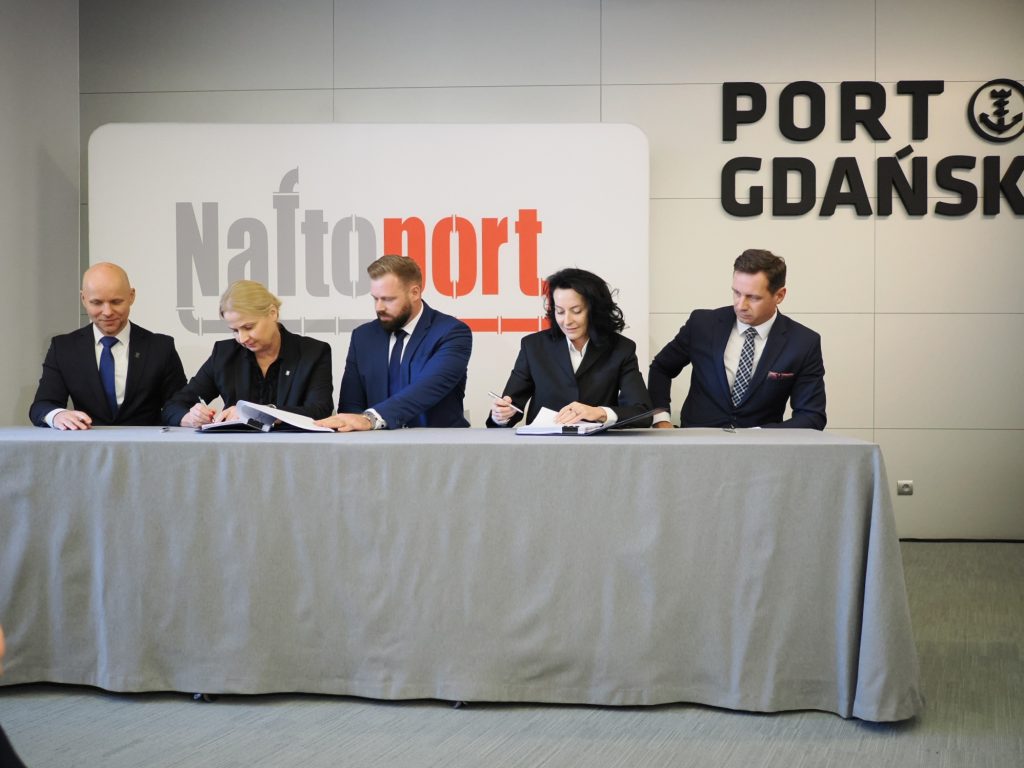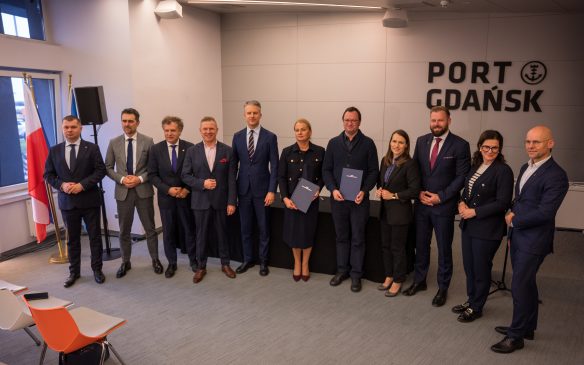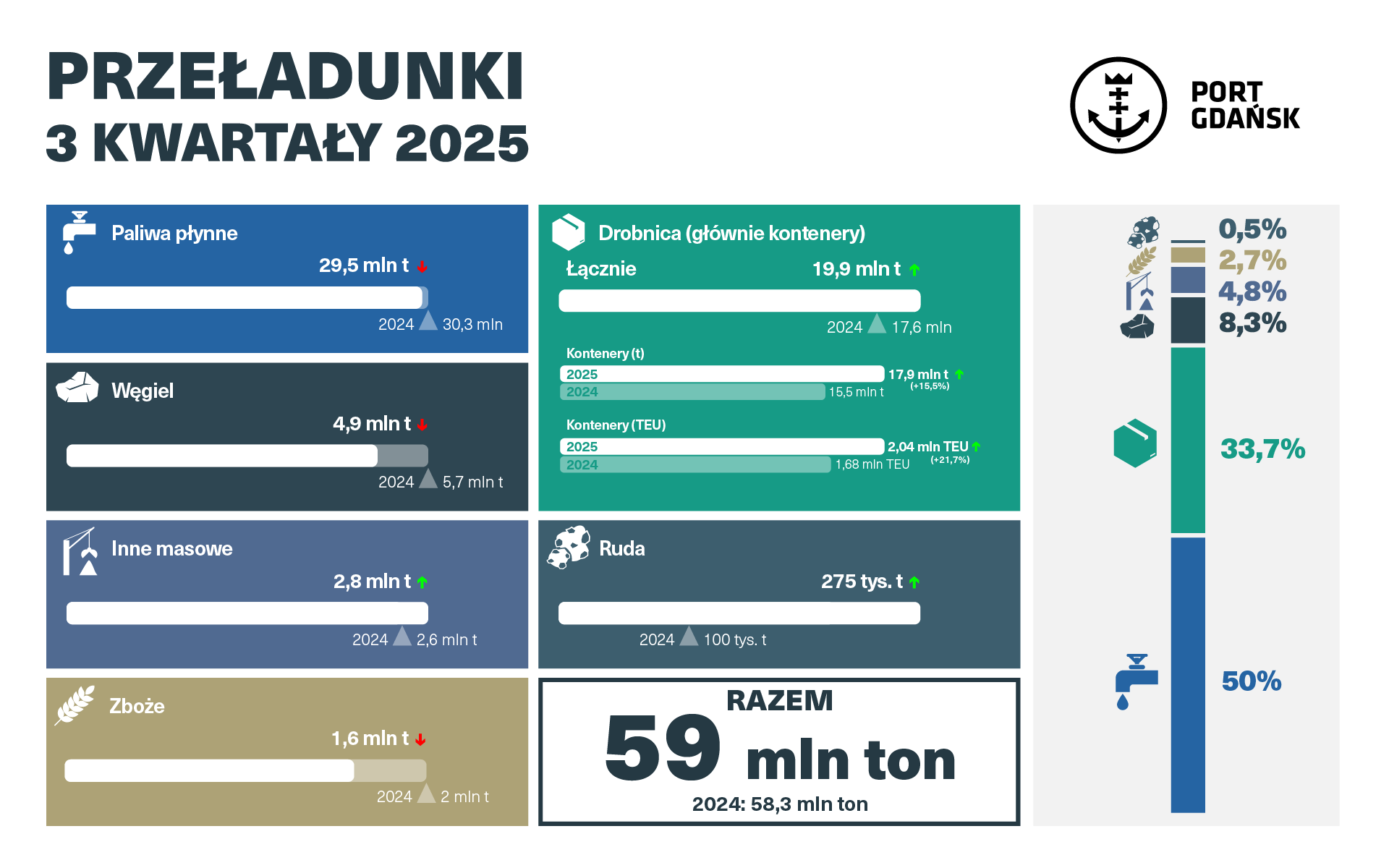A new chapter in the history of the Northern Port – expansion of Naftoport in the Port of Gdańsk begins

Construction is underway of a new, sixth cargo handling station at Naftoport. This is another step in the development of the infrastructure of Poland’s largest seaport. The investment is not only going to increase the terminal’s cargo handling capacity, but, above all, it is going to strengthen Poland’s energy and economic security.
Naftoport, a company belonging to the PERN S.A. group of companies, together with the Management Board of the Port of Gdańsk, is starting the construction of a new cargo handling station, known as ‘W’. An agreement has just been signed with the general contractor for the investment – DORACO. This is a new chapter in the history of Polish oil infrastructure.
Poland’s security and future
Naftoport is a key element of the national energy infrastructure, and allows for the import and export of crude oil and petroleum products by sea. It supplies refineries in Gdańsk and Płock, and handles transit to Central European countries. Its expansion with another cargo handling station is a project with significance far beyond the scope of a local investment. It is a venture that combines economic development with national security. In an era of global tensions and changes in the energy commodity market, Poland has been consistently strengthening its position as an independent country in terms of oil and fuel supplies.
During a conference on the signing of the agreement (13 November), the government’s representative for strategic energy infrastructure, the Deputy Minister of Energy, Wojciech Wrochna, emphasised that the expansion of Naftoport is an extremely necessary and strategic investment.
‘The terminal, already a key element of the country’s energy infrastructure, is set to increase its cargo handling capacity. We need this additional capacity, especially in view of what happened three years ago – the war in Ukraine and the cut-off of raw material supplies from the east. We have been consistently pursuing the goal of diversifying our sources of supply and becoming independent from energy blackmail. This investment will significantly increase our resilience and allow us to build a new, more stable and secure energy system – independent of Russian raw material’, said Wojciech Wrochna. ‘As a government representative, I am responsible for investments of strategic importance that increase the country’s energy security – and this is precisely what this investment is. Thanks to this investment, our security will increase, infrastructure will become more resilient, and oil cargo handling capacity will grow. All this results in a greater sense of everyday security for citizens. Although we rarely think about it when we pull up to a filling station, each of us wants to be sure that fuel is always be available at a stable price. Today’s investment may not be visible from the perspective of the average driver, but it is crucial for ensuring safe and reliable access to fuel and oil for Poland in the coming years. By doing so, we increase the safety of every citizen.
The Deputy Minister of Infrastructure, Arkadiusz Marchewka, who was present at the event, drew attention to the growing role of ports in ensuring Poland’s security.
‘This investment is the best example of this. We have been implementing measures that strengthen our security, because the power and importance of the Baltic Sea in the context of energy security continue to grow. Poland has been becoming an energy hub in the Baltic Sea. If we look at what has been happening in the Gulf of Gdańsk area, we see very significant projects of huge importance in terms of energy security. Apart from the expansion of Naftoport we have been building an FSRU gas terminal and an offshore wind farm installation terminal, which has been made possible thanks to funds released from the National Reconstruction Plan. Poland’s first nuclear power plant is being built not far to the west from here. The largest components needed for its construction will be delivered by sea, thanks to the kilometre-long pier that we are currently building’, said Deputy Minister Marchewka.
The Port of Gdańsk – the energy hub of the region
‘Exactly half a century after the commissioning of Naftoport’s predecessor, the liquid fuel base in the Northern Port – one of the most important investments in the post-war history of the Polish economy – another strategic project is underway. The construction of station ‘W’ is an investment that strengthens Poland as an independent and secure country. It secures the diversification of raw material supplies, increases our resilience to geopolitical turmoil and reinforces the role of the Port of Gdańsk as the energy heart of the Baltic Sea region. We are creating infrastructure that not only responds to the challenges of today, but is also prepared for the future – for new types of fuels and the energy transition that awaits us in the coming decades’, said Dorota Pyć, President of the Port of Gdańsk. ‘Today we are taking an important step towards the future – a safe, modern and energy-independent Poland. A Poland that will have energy freedom – and this freedom is intrinsically linked to security. Because security is nothing more than freedom from danger’.
The expansion of the terminal is also a step towards modern, resilient port infrastructure that ensures continuity of raw material supplies and energy stability in the region.
Naftoport accounts for over 50% of total cargo handling in the Port of Gdańsk. In 2024 it achieved record results – 489 tankers served and approx. 39 million tonnes of oil and fuel handled.
The growing demand for imports of raw material by sea, observed for several years, has prompted the expansion of the terminal with a new station, which should increase Naftoport’s operational capacity and throughput to 49 million tonnes per year.
The investment includes the construction of a new quay, pipe flyovers, access roads, technical infrastructure and environmental protection systems. It is to be the second station in Naftoport adapted to handle the world’s largest tankers – VLCCs (Very Large Crude Carriers), with a length of over 300 metres and a draught of up to 15 metres. The cargo handling capacity of the new facility is set to reach 9 million tonnes per year. The new station will allow the handling of four large tankers simultaneously, and therefore shorten handling cycles.
‘The investment in a new cargo handling station significantly strengthens the fuel and energy system in Poland and the region. In the long term, the ‘W’ station will allow Naftoport to maintain its high operational capacity, as well as further diversify its directions and handle growing volumes. It is our own anti-crisis policy, which increases our resistance to market fluctuations and unpredictable events that can change the global situation in the blink of an eye. In such moments, it is not prediction that counts, but preparation. Thanks to this investment, the PERN Group gains additional opportunities to meet the needs of domestic refineries and recipients, which translates into security of supply, economic independence and peace of mind for citizens’, said Daniel Betke, President of Naftoport.
But the expansion of the terminal is not just an energy project. It is also a boost for the region’s economy, generating new work and orders for the construction and hydraulic engineering industries.
DORACO – general contractor of the investment
The general contractor for the investment is DORACO, one of Poland’s leading construction companies, which has been specialising in complex hydraulic engineering investments on the Baltic Sea and strategic infrastructure projects throughout Poland for 35 years.
DORACO has completed numerous projects in the port and industrial sectors, including the expansion of the Wisłoujście and Zbożowe quays in the Port of Gdańsk, the upgrade of the Hel Quay in the Port of Gdynia and the infrastructure at the GRYFIA Shipyard in Szczecin. DORACO is currently carrying out a comprehensive upgrade of the Wiślane Quay in the Port of Gdańsk and investments for the offshore sector in Ustka, Łeba, Świnoujście and Darłowo.
‘Today Poland’s sovereignty is based, for example, on energy independence and domestic execution potential. We combine both of these elements in a single project: “Expansion of the Naftoport Terminal and the North Quay in Gdańsk”. By building infrastructure for Naftoport, which makes Poland independent of external supplies, we at the same time strengthening the local supply chain, based on Polish companies, engineering expertise and domestic subcontractors. The expansion of the terminal is an investment in the country’s resilience. Here, local content is not an addition, but the backbone of the project. The more strategic projects that are implemented by companies with Polish capital, the more energy and raw material security becomes a reality. Our sovereignty begins where forced or dominant dependence on other countries ends’, said Angelika Cieślowska, President of the Management Board of DORACO.
The planned completion of construction works and the start of raw material cargo handling is scheduled for the second half of 2028. The cost of the investment is expected to amount to approximately PLN 455 million net, of which PLN 239 million will be financed by Naftoport, and the cost of the ZMPG scope is approximately PLN 216 million.
The expansion of Naftoport in Gdańsk is not only an infrastructure investment – it is a symbol of Polish energy sovereignty and responsible economic policy. It allows the Port of Gdańsk to strengthen its position among the most important cargo handling ports in the region.



